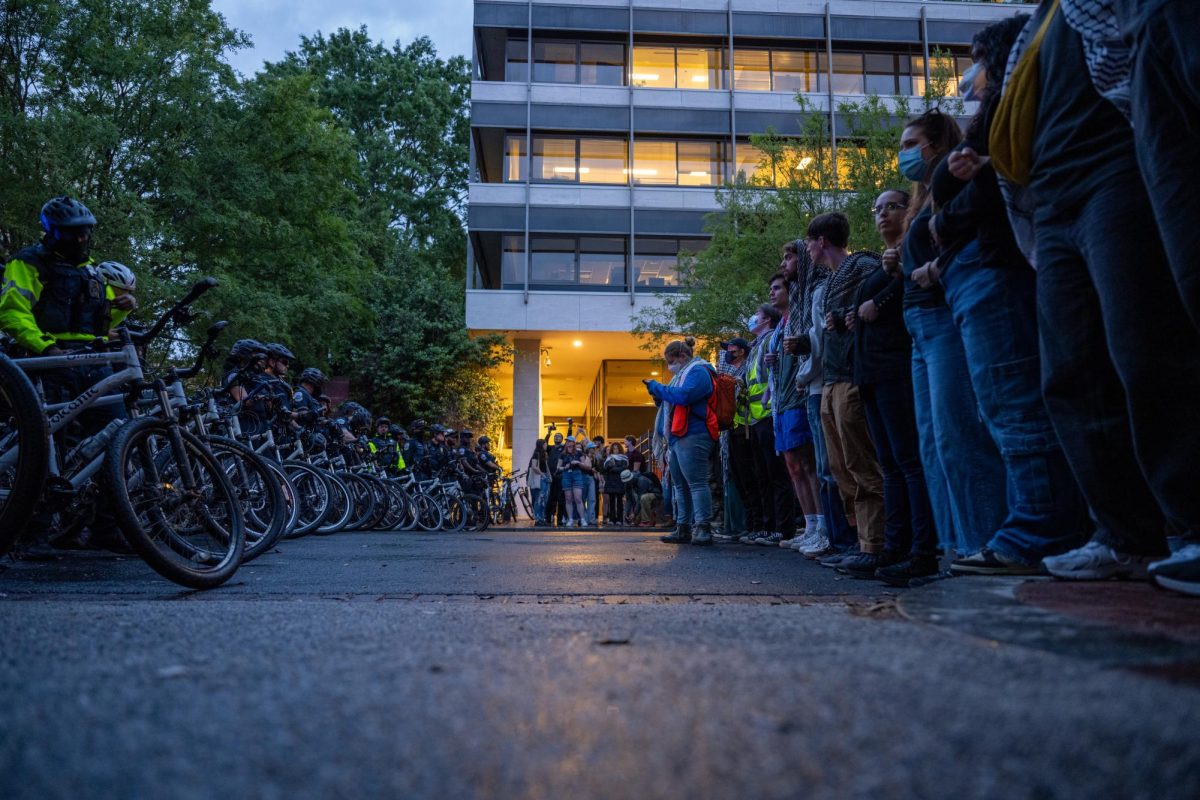On April 26, local police denied GW officials’ request to clear a largely peaceful pro-Palestinian encampment in University Yard. Two weeks later, hundreds of officers swarmed U-Yard, arresting more than 30 demonstrators for charges related to their occupation of the plaza and assaults on a police officer.
Since the encampment began more than two weeks ago, questions and commentary about the encampment, as well as those at colleges across the country, have been ceaseless. Students, staff and faculty alike have called for the financial and material divestment of the University from companies with ties to Israel and the protection of pro-Palestinian speech. Others have rallied to protect Jewish students from antisemitism in the wake of signs and chants that they said conveyed hateful speech.
While the community holds varying sentiments toward the protest, and even police intervention, no one wanted students getting hurt. Yet, when local police invaded campus on Wednesday, GW followed suit with universities that have ended encampments on their campuses with brute force.
From the first day of the encampment, University President Ellen Granberg requested the assistance of local police. After police rejected the request due to concerns of the “optics” of clearing a largely peaceful demonstration, Granberg released a community message pleading for the District’s support in managing the encampment. In this case, “help” took the form of Metropolitan Police Department officers eventually using pepper spray, batons and Flex Cuffs on students after monitoring campus for two weeks.
Protesters broke property laws by remaining in the encampment after repeated requests from officials to relocate and the University outlined the policies the demonstration violated several times. Actions have consequences, but when officials call for police on their own students, they fail the people they’re supposed to serve.
As the eight GW arrested students awaited processing in a local jail on Wednesday, the University stayed quiet, only to say hours after that the clearing was a “orderly and safe” police operation. The University’s messaging about the arrests and sweep was out of touch, emblematic of their physical distance from the protest. Some officials from the Office of Student Life were seen speaking with demonstrators at the encampment, but Granberg never made an appearance.
Granberg welcomed House Republicans into a meeting before she had spoken with demonstrators about their demands. A student protester rightly stated, “It is shameful that the University is more willing to speak with Congress, to the mayor, to the police than to speak with us, as their own student body.” When officials play a game of hot potato with their leadership, how can officials expect students to believe that they hold student interests at the heart of their actions?
GW’s location in D.C., a territory without statehood, blurs the line of the federal government’s authority over D.C. residents. Rep. William Timmons (R-SC), a GW alum who toured the encampment alongside fellow members Wednesday, said the publicity garnered from their visit would put “increased pressure” on D.C. officials to clear the protest. During the congressional walk-through, which attracted a frenzy of press, during which Rep. Lauren Boebert (R-CO) urged Mayor Muriel Bowser to call in the National Guard to clear the encampment and attempted to rip down a Palestinian flag that demonstrators hung. If GW wades into the choppy waters of adjudicating what speech is or isn’t disruptive on campus among students, it should hold political leaders to the same standard.
The House Oversight Committee was set to hold a hearing on Wednesday that would have called on Bowser and MPD Chief Pamela Smith to explain the rationale behind their refusal to clear the U-Yard encampment after GW officials requested an end to the demonstration. Fewer than 12 hours before the meeting, however, local police raided U-Yard at about 3 a.m. The protest started at GW, but the final say ultimately came well past the reach of the GW community.
Following police’s clearing of the encampment, it remains unclear exactly what role the University, MPD and local officials played in the decision to forcefully sweep the demonstration. But before D.C. even faced public pressure to clear the encampment, GW dealt the first card in bringing the police to our University. Until officials share more about their decisions with the community, the University’s messaging and efforts to heal our campus are obsolete.
The editorial board consists of Hatchet staff members and operates separately from the newsroom. This week’s staff editorial was written by Editorials Assistant Paige Baratta, Opinions Editor Andrea Mendoza-Melchor and Contributing Opinions Editor Madie Turley, based on discussions with Culture Editor Nick Perkins and Social Media Director Ethan Valliath.


